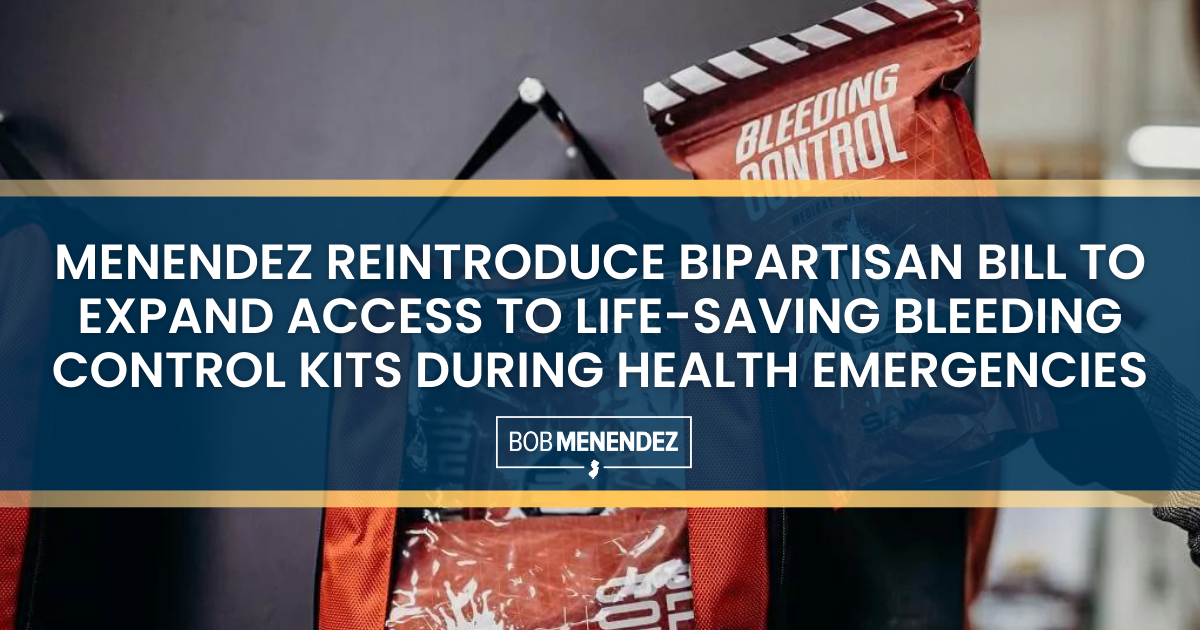Source: United States Senator for New Jersey Bob Menendez
WASHINGTON, D.C. – U.S. Senators Bob Menendez (D-N.J.) and John Boozman (R-Ark.) today reintroduced the Prevent Blood Loss with Emergency Equipment Devices (BLEEDing) Act that would amend the Public Health Service Act to authorize a new grant program with the U.S. Department of Health and Human Services (HHS) and Administration for Strategic Preparedness and Response (ASPR). It would help expand access to life-saving bleeding control kits in schools, malls, houses of worship, libraries and other gathering places in communities across the country.
“Think about the lives that can be saved in the wake of a terrible car crash, a bad accident on the job or at the skating rink, or God forbid, a mall or school shooting, if people in every community had the know-how and quick access to the resources they need to stop severe bleeding during medical emergencies before first responders arrive on the scene,” said Sen. Menendez, a senior member of the Senate Finance Committee that sets national health policy. “Our common-sense legislation will provide communities in New Jersey and across the nation with the training, funding, and access to tools needed to save lives.”
“We can help save lives by expanding access to tools and resources to prevent traumatic blood loss,” said Sen. Boozman. “This is a practical strategy to empower individuals to administer life-saving aid in an emergency.”
According to the New England Journal of Medicine, around 60,000 Americans die each year from uncontrolled hemorrhage, and approximately 75% of these deaths are due to physical trauma. According to the American College of Surgeons, “uncontrolled hemorrhage (severe bleeding) remains the single most preventable cause of death after both military and civilian injuries.” Uncontrolled hemorrhage can become a life-threatening injury in less than five minutes and a rapid response is critical.
The Prevent BLEEDing Act would:
- Authorize $10 million per fiscal year for the grant program;
- Allow grantees to purchase or distribute anti-blood loss supplies (tourniquets, gauze, dressings, or other appropriate materials) for use in medical emergencies in places where people gather;
- Ensure communities can provide training on the proper use of anti-blood loss supplies to enhance public safety; and
- Direct the Government Accountability Office (GAO) to study the trends on access to and utilization of bleeding control kits and training across rural, urban and suburban areas.
ASPR will establish a formula to allocate the funds that takes into consideration relative populations of each geographic area for which a grant is made. Grants cannot be restricted to the above based on population size or the rate of violent crimes.
Under the legislation, the GAO would have to submit its report to Congress no later than 18 months after enactment. The goal of including language to study to gain a better understanding of the utilization of bleeding control kits and gain access to trend data about their use to better inform future policy on the use and need for bleeding control kits and training.
The American College of Surgeons, Eastern Association for the Surgery of Trauma, Trauma Center Association of America, American Association for the Surgery of Trauma, American Society of Trauma Nurses, American Association of Neurological Surgeons, Congress of Neurological Surgeons, American College of Emergency Physicians, Emergency Nurses Association, American Association of Orthopedic Surgeons, and Society of Thoracic Surgeons support the bipartisan legislation.
“I applaud Senators Menendez and Boozman for introducing the Prevent Blood Loss with Emergency Equipment Devices Act (Prevent BLEEDing Act). Uncontrolled bleeding is the number one cause of preventable death from trauma and victims of severe bleeding can die within 5-10 minutes. The Prevent BLEEDing Act is crucial to bring STOP THE BLEED® training and equipment directly to all US citizens. Similar to CPR, a civilian familiar with basic bleeding control techniques is equipped to save a life,” said Patricia L. Turner, MD, MBA, FACS, Executive Director and CEO of the American College of Surgeons. “This critically important legislation will help to educate and empower individuals to take life-saving action during an emergency when minutes matter.”
“The Society of Trauma Nurses (STN) is pleased to endorse the Prevent BLEEDing Act,” said Linda Reinhart, MSN, RN, CNS, CCRN, TCRN. “This legislation will help improve access to bleeding control equipment in public spaces. Equipping civilian ‘immediate responders’ with the tools and training to stop traumatic bleeding will help improve outcomes in cases of accidents and mass casualty events and reduce preventable deaths from bleeding.”
“In an emergency, a matter of seconds can be the difference between life and death,” said Christopher S. Kang, MD, FACEP, president of ACEP. “Just like knowing CPR, how to help a choking victim, or how to use an AED, with basic training and access to bleeding control kits, we can empower millions of potential lifesavers to be the help and stop the bleed, until help arrives. ”
Sen. Menendez first introduced this legislation in February 2020, and reintroduced during the last Congress alongside Sen. John Boozman and Representatives Brad Wenstrup and Tom O’Halleran. Last year, Sens. Menendez and Boozman led a Senate resolution commemorating the 100th anniversary of the American College of Surgeons Committee on Trauma.
Find a copy of the bill text HERE.
###
